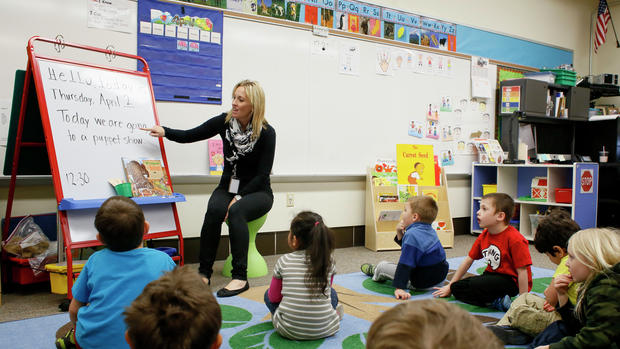School Policy Is Definitely Leading to the Misdiagnosis of ADHD

Joelle Hoefer teaches a preschool class Thursday, April 2, 2015, at the Probstfield Center for Education in Moorhead. Gov. Mark Dayton has proposed funding all-day pre-kindergarten throughout the state. Michael Vosburg / Forum Photo Editor
My Sunday print column dealt with a report from Harvard researchers indicating that children, particularly males, with August birthdays have a much higher rate of being diagnosed with ADHD than children with birthdays in other months.
Why is it happening?
In his 2008 book Outliers, Malcolm Gladwell noted that a disproportionate number of professional hockey players from Canada had birthdays early in the year. Particularly in months like January and February. The explanation Gladwell found for it was that youth hockey leagues use January 1 as the cut off for their age groups. Thus, players with birthdays in January and February are typically the oldest, and thus most physically and emotionally developed, kids in their cohorts.
The same phenomena seems to be happening with ADHD in our schools. The Harvard researchers looked at states with September 1 cutoffs for K-12 school enrollment. In those states, kids with August birthdays are typically the youngest – or least mature – in their age groups. A fact which seems to be contributing to higher rates of ADHD diagnoses.
Anyway, in the Fargo Forum today Rich Veit, who describes himself as “a school psychologist with 31 years of experience working in North Dakota schools,” takes issue with my column:
When quoting research results from Harvard University, Port states “. . . teachers and other school personnel are more likely than physicians or parents to first suggest that a child may have A.D.H.D.” It appears that Port is implying that teachers and school personnel are overstepping their bounds when they suggest that a child may have difficulties with attention.
I should point out that the words Veit quotes aren’t actually mine. They’re from a New York Times column published by the researchers and quoted by me in my column. I’m not implying anything because the quoted words aren’t mine. And Veit leaves out some important context.
Here’s the entirety of the passage I quoted from the Times column: “Indeed, some evidence suggests that teachers and other school personnel are more likely than physicians or parents to first suggest that a child may have A.D.H.D.”
Those errors aside, Veit incorrectly identifies my motives in writing about A.D.H.D. diagnoses. He formulates it as a criticism of educators. My column, however, was about the conservative ideology and the unintended consequences of public policy. I tend to favor government that acts slowly, and with restraint, because public policy is a blunt instrument which can cause far-reaching and unintended outcomes.
But since he did bring the issue up, there sure seems to be a problem with our educators expecting students to behave a certain way based on the class or cohort they belong to as opposed to their individual situations.
I hardly think it’s intentional. I don’t believe educators are doing this nefariously, or that they’re being negligent. Yet it remains a very real phenomena, and one we should address.




